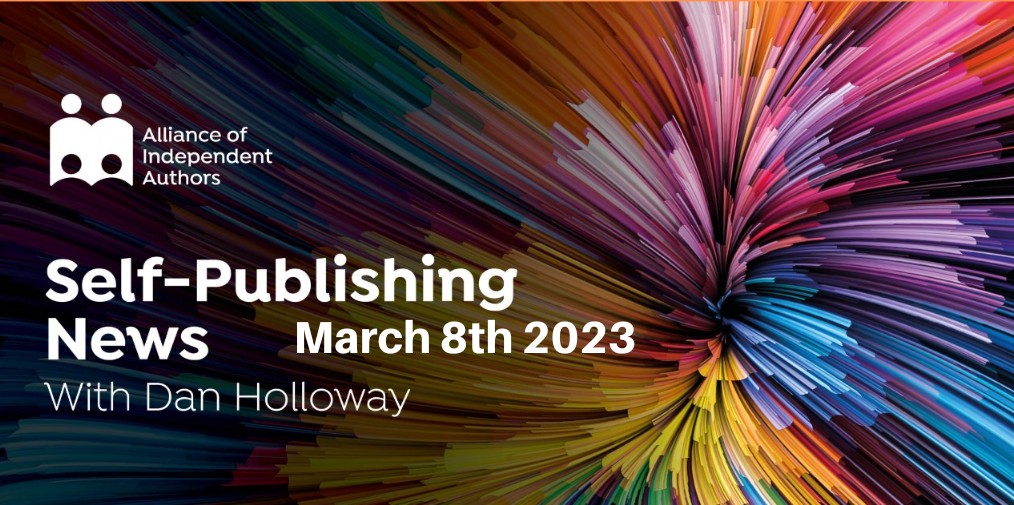In this week's Self-Publishing News Special, ALLi News Editor Dan Holloway takes a look at another indie award success, and how Book Fair season will tackle the topic of AI.

ALLi's News Editor Dan Holloway
In this month's podcast, Howard and I discuss the implementation, at last, of Amazon's revised ebook returns policy. We also take a look at the Department of Justice's antitrust case against Goole and the overall state of journalism as a source of reliable income.
Indie author Letty McHugh wins the Barbellion Prize
I love nothing more than reporting on indie award success. And this makes it two weeks in a row I have been able to do so. The Barbellion Prize is awarded for books that offer an insight into disabled experience. Authors may or may not themselves be disabled, though so far the prize winners I believe have been. The 2022 Prize, awarded in February this year, went to Letty McHugh for Book of Hours: An Almanac for the Soul. Huge congratulations to Letty on the achievement. As a disabled author, it’s great to see an award like this. And as an indie it’s doubly pleasing to see it go to a self-published work.
Do make sure you take a look at ALLi's awards page to find awards that are open to indie authors, along with evaluation from our team.
Indie Author Income Survey (reminder)
That provides the perfect segue into a reminder about ALLi’s Indie Author Income Survey. One of the things this survey will do is to provide, for the first time, really detailed data not just on indie author incomes but on demographics. One of the things I will be fascinated to see is the representation of disabled authors in the indie cohort. There will be many other similar insights. And the opportunity to see how these change over time.
But that will only be possible if we get a large and representative sample of indies authors completing the survey. And that’s where you come in! If you haven't already done so, you can take part in the survey here. ALLi wants to hear from anyone who spends at least 50% of their working time either writing or on other writing-related activities, like editing, teaching (or in my case buying stationery).
Have a Guess What the Hot Topic for This Year’s Fair Season is?
I feel like Bob Ross asking, “Can you tell what it is yet?” And like a Bob Ross painting the answer is that, when it comes to the hot topic for this year’s Book Fair season, of course we can guess what it is. Bologna Children's Book Fair has just kicked off the European Book Fair season. And the “hair raising topic” is AI. Of course. In many ways, it makes sense for this to be prominent at an event dedicated to children's books. It was all the way back in the prehistoric times of early January that Ammar Reshi announced to the world he had used ChatGPT to write a children's book and Midjourney to illustrate it.
At London Book Fair, the panel that really piques my interest is one with a heavy ALLi contingent. Joanna Penn and Orna Ross will be among those looking at how AI (and other technologies) can help authors in the years to come on April 19th at Author HQ. For me, what will be most interesting of all is following the content and the tone of the conversation as the year progresses. It's a very long time indeed between now and Frankfurt in the autumn. It's a fair bet that AI will still be the hot topic when Frankfurt rolls around. It would be a foolhardy move to predict what the take will be by then!
But in Saudi Arabia, BookTok is Fairs' Big Talking Point
More interesting is one of Mark Williams’ regular reports on Fair season across Arab markets. Saudi Arabia is currently holding the Al-Sharqiya Book Fair (running until March 11). The focus there is much more what we saw last year in Europe. BookTok. As Williams also reports, Saudi Arabia has clocked almost half a billion views for the BookTok hashtag in the past 6 months. And the new fair is capitalising on that growth by doing similar to what frankfurt did last year and handing over chunks of stage time to BookTok created content. The close relationship between TikTok and the book world may be evolving, but it’s far from over.
Authors Guild Writes a Model Contract Clause Prohibiting AI Training
And before we think AI is only just clinging on to the news this week, thanks to Nate Hoffelder for this tip: the Authors’ Guild has drafted a new model clause for contracts that prohibits the use of text for AI training. One sentence particularly drew my attention. Although it’s very clear that the clause is “non-exhaustive” it singles out “technologies that are capable of generating works in the same style or genre as the Work.” This is a clear reflection of the kind of concerns that artists have over technology producing works in their own style, trained on their images, for which they receive nothing.
Self-publishing News: Self-published author Letty McHugh wins the Barbellion Prize Share on X




